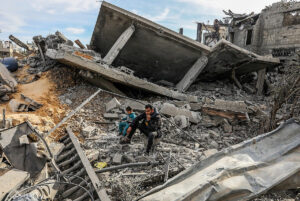With no safety in Rafah, Palestinians are fleeing back to Gaza’s decimated center

Palestinians at the site of Israeli airstrikes in Rafah, southern Gaza Strip, 12 February 2024
Ruwaida Kamal Amer and Ibtisam Mahdi report in +972 on 14 March 2024:
Rafah is nearing breaking point. The small city on Gaza’s southern border with Egypt has swelled in recent months to accommodate approximately 1.5 million Palestinians displaced from all over the besieged Strip. Residing predominantly in hastily erected and poorly insulated tents, and starving from the severe lack of food, every family here has a heart wrenching story of loss and survival. The fear of what’s still to come, though, is overpowering.
Rafah was supposed to be a “safe zone,” a haven in which to seek refuge from Israel’s relentless bombardment and ground assault. But this was never really the case: Israel has been bombing Rafah the whole time. Now the airstrikes are intensifying — even targeting the tent encampments — and the Israeli army’s long-threatened invasion of the city appears imminent.
On March 2, an Israeli airstrike killed at least 11 Palestinians living in tents next to the Emirati Hospital in the Tel al-Sultan neighborhood, west of Rafah’s center. Mahmoud Ahmed, 36, was nearby with his family. “We were sitting and talking in our tent when suddenly we heard the sound of a powerful explosion and felt the tent being blown aside,” he told +972.
“My son was playing with the neighbors, and I rushed out screaming and looking for him,” Ahmed recounted. “After an hour, he came back crying and shaking. He had been near the site of the bombing, and out of fear he forgot where our tent was.”
Aya Rous, a mother of four who is also 36, was already living in Rafah with her family before the war started. “At first we thought Rafah was safe,” she explained. “We took in many relatives displaced from the areas that the army ordered them to leave. But suddenly, life in Rafah changed. Places started being targeted more. Now, we are afraid to leave our home. There are no safe areas here.”
On March 9, Israel bombed Burj al-Masry — one of the largest residential towers in Rafah, which was home to approximately 300 people — after warning the residents to evacuate. And it was nearby to where Rous is living: “This tower is huge, and around it are schools sheltering thousands of displaced people. Everyone rushed out in fear, screaming and looking for another safe place. The missiles didn’t succeed in destroying the whole building, but does that mean we’re safe? Of course not.”
As a result of the intensification of Israel’s bombings in the city, some Palestinians who took refuge in Rafah have fled to areas further north.
